Solidarity with Eastern DRC amid attacks on people and environment by March 23 Movement

SIGN ON A call for international solidarity against the environmental and humanitarian crimes committed in eastern Democratic Republic of the…

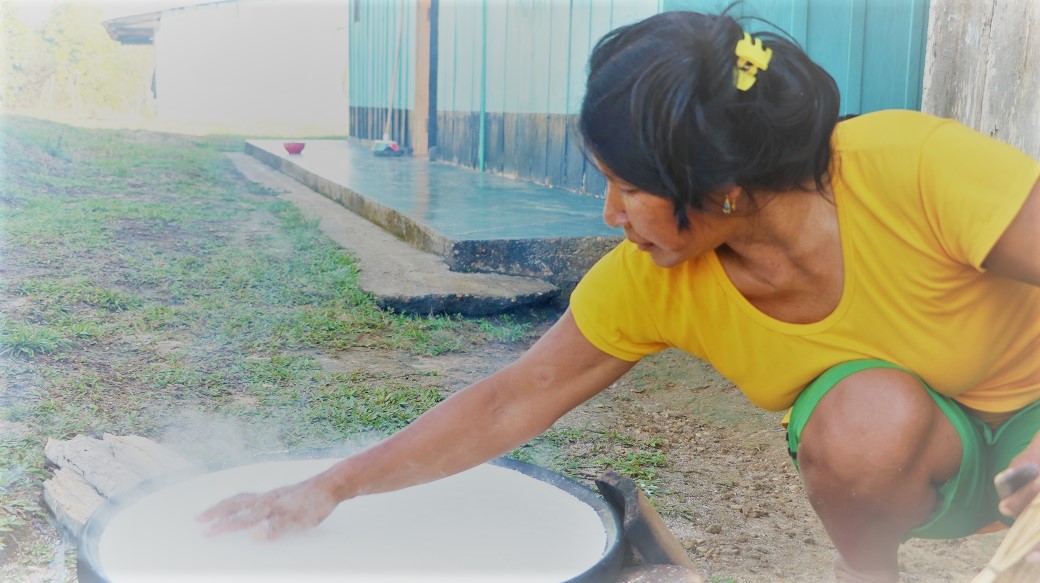
The Global Forest Coalition (GFC) will participate in the 13th Meeting of the Conference of the Parties (COP13) to the Convention on Biological Diversity (CBD), which will be held in Cancùn from 4-17 December 2016.
Some of the main issues to be discussed at COP13 concern a review of progress, strategic actions and financing to enhance implementation of the Strategic Plan for Biodiversity 2011-2020 and the Aichi Targets; Article 8(j) and related provisions; and marine and coastal biodiversity, among others. The official theme of “mainstreaming biodiversity for well-being” shines a spotlight on CBD Parties’ mandate to integrate the conservation and sustainable use of biodiversity in the key sectors of agriculture, fisheries, forestry and tourism.
GFC’s main focus at COP13 is to promote the role of Indigenous peoples and local communities in mainstreaming biodiversity and in implementing the Strategic Plan through collective action, including through a gender lens. Towards this aim, GFC is facilitating the participation of indigenous and community leaders, including women, who are involved in assessing their community conservation efforts and identifying self-determined forms of support through the Community Conservation Resilience Initiative. At the same time, GFC is actively collaborating with the Gender Program of the CBD Secretariat and co-leading the Women’s Caucus, which will meet on a daily basis throughout the negotiations.
GFC is also concerned about the growing emphasis in the CBD on private sector engagement and market-based approaches, which arguably commodify nature and further perpetuate the root causes of biodiversity loss, thus deepening inequalities. In order to mainstream biodiversity and achieve the Strategic Plan, perverse incentives for unsustainable practices in the agriculture, fisheries and forestry sectors must be phased out, eliminated and/or redirected toward initiatives that actually support conservation and sustainable use of biodiversity, including those of indigenous peoples and communities and that take into consideration a gender perspective to prevent deepening gender gaps. For example, the heavily subsidised livestock and feedstock industry is the main cause of forest and biodiversity loss in Latin America, the continent with the highest rates of deforestation. These issues are considered in GFC’s new global report on unsustainable livestock – with case studies from around the world – which will be launched on 5 December.
See the list of our spokespersons available for interviews here. (Español)
Ashlesha Khadse, Media Officer
Whatsapp, imsg: +91 8600839193, Mexico number: +52 998 4111 965
ashlesha@globalforestcoalition.org
Skype: Ashlesha.khadse
(English, Spanish and Hindi)
 |
 |
 |

SIGN ON A call for international solidarity against the environmental and humanitarian crimes committed in eastern Democratic Republic of the…
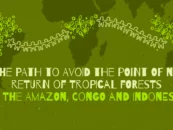
The path to avoid the point of no return of tropical forests in the Amazon, Congo and Indonesia The Amazon,…

Global Forest Coalition at CBD COP16 Real Solutions, Not False Promises From 21 October to 1 November 2024,…
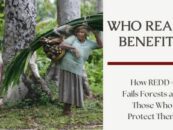
In this new briefing, launched at the UN Climate Change Conference (SB60) in Bonn, we unravel the confusions, contradictions and…
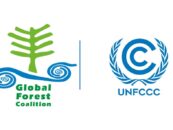
As the global climate negotiations continue to steer the world headlong towards climate catastrophe, the Global Forest Coalition (GFC) and…

GFC is looking for an enthusiastic, proactive, and organized campaign associate to engage with our global membership and facilitate learning…

Celebrating the Global Day of Action: “World Bank, Is Factory Farming Worth it?” GFC as part of the Stop…
Indigenous peoples, forest communities, and nature should be at the center of forest protection, not investors, groups say April 24,…

UPDATE: Here’s how it went! Factory farming is a major driver of deforestation worldwide. We’re speaking out on April 24th…
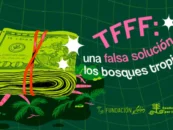
A new report on the proposed ‘Tropical Forest Forever Facility’ by the Global Forest Coalition and Fundación Solón English /…

FOR IMMEDIATE RELEASE LONDON / UTRECHT, 31 March 2025 – As the International Maritime Organization (IMO) prepares to finalize negotiations…

The IMO Should Listen to Outcry Over False “Green” Bioenergy Solution Bioenergy, including crop-based biofuel, is often portrayed as “low-carbon,”…

Tugai Forests: Central Asia’s Hidden Oasis and the Fight for Their Survival In the heart of Central Asia, where arid…

A joint statement in favor of truly sustianabile EU energy policy The Global Forest Coalition is among the signatories of…
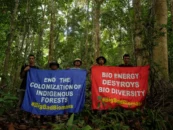
Photo: Adzwari Rizki/Trend Asia Press Release Road to COP 30: Global South Civil Societies Gather Voices Demanding Tropical Rainforest Protection From…

Movements are gearing up for the People’s Summit in Brazil during COP30 By Valentina Figuera Martínez, Kwami Kpondzo and Megan…

In an urgent press release, Biofuelwatch and the Global Forest Coalition (GFC) called on the International Maritime Organization (IMO) and…
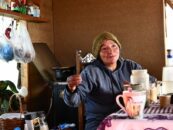
Sign on Letter to President Boric of Chile demanding the repeal of the Usurpation Law which violates international Indigenous Rights…

Check out the recent analysis report by Brot für die Welt (Bread for the World), which explores the critical intersection…
Check out the latest issue of Roots, the Global Forest Coalition newsletter that shares all the latest work and updates…